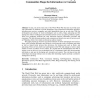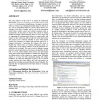932 search results - page 22 / 187 » Where in the Wikipedia Is That Answer |
JUCS
2006
13 years 7 months ago
2006
: To date, one of the main aims of the World Wide Web has been to provide users with information. In addition to private homepages, large professional information providers, includ...
SIGIR
2011
ACM
12 years 10 months ago
2011
ACM
This work explores the problem of cross-lingual pairwise similarity, where the task is to extract similar pairs of documents across two different languages. Solutions to this pro...
I3
2007
13 years 9 months ago
2007
The main objective of this work is to exploit the relationship between the information findability problem and a subject-based organization of information. Identification of a sub...
FQAS
1998
Springer
13 years 12 months ago
1998
Springer
Abstract. Many heterogeneous database system products and prototypes exist today; they will soon be deployed in a wide variety of environments. Most existing systems suffer from an...
LPNMR
2005
Springer
14 years 1 months ago
2005
Springer
Open answer set programming (OASP) is an extension of answer set programming where one may ground a program with an arbitrary superset of the program’s constants. We define a �...


